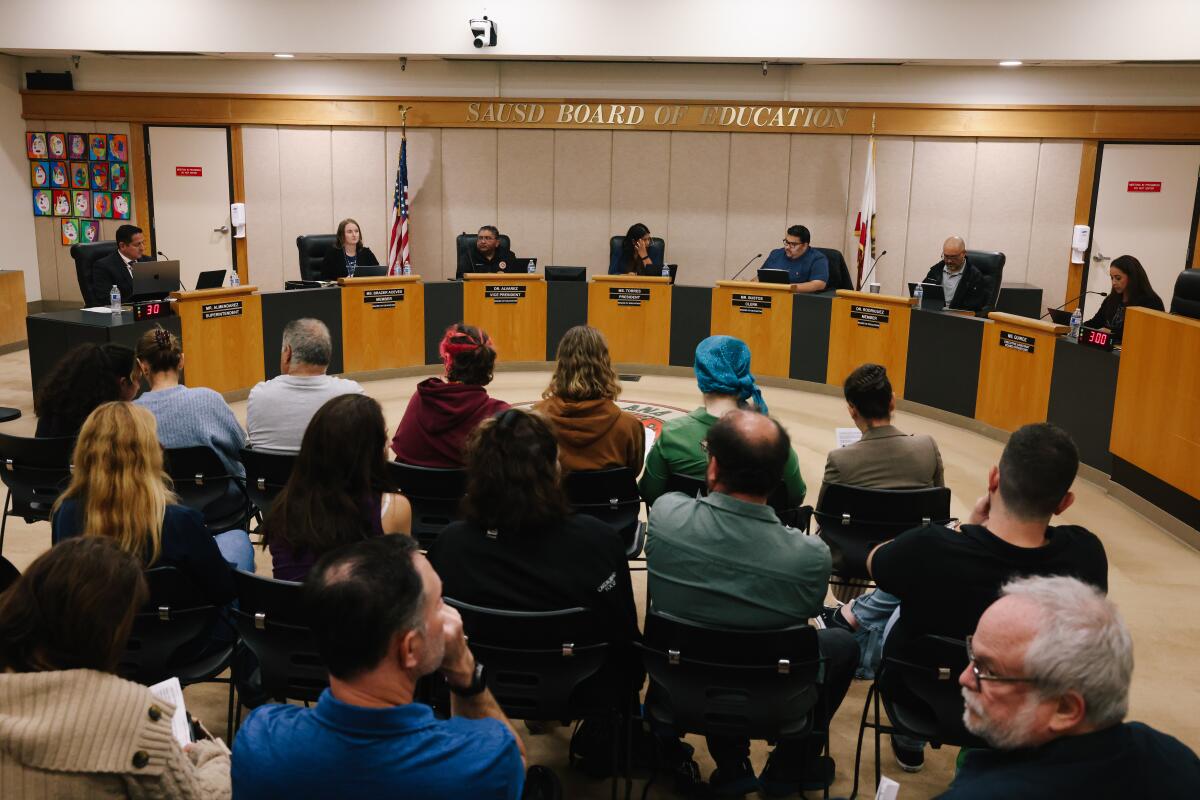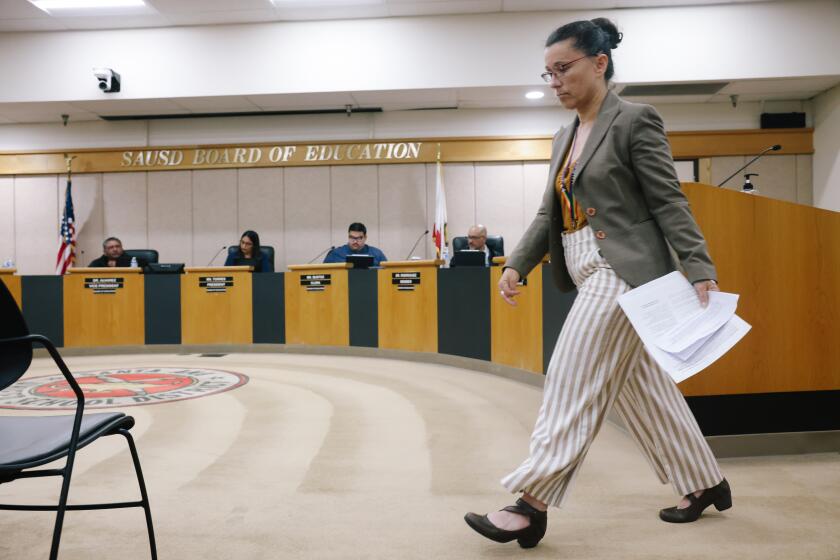Jewish advocacy groups allege antisemitism behind Santa Ana’s ethnic studies rollout

- Share via
An ethnic studies curriculum at Santa Ana Unified School District is headed for a court battle in an ongoing lawsuit that alleges courses were developed in secret and “infected” with antisemitism.
Before a scheduled Sept. 19 hearing, the Anti-Defamation League, Brandeis Center and American Jewish Committee point to the term the “Jewish Question” appearing on an ethnic studies steering committee agenda in making their case.
Attorneys also obtained text messages that appear to show senior district officials discussing a strategy of the school board to hold votes on Jewish holidays, like Passover, to approve ethnic studies classes without protest from the Jewish community.
“The policy-making committee that was established saw Jews as an obstacle to exclude in the process,” said James Pasch, the ADL’s senior director for national litigation. “Due to that exclusion, the end result was the creation of anti-Jewish, anti-Israel classes being implemented into the curriculum.”
An Orange County school district’s efforts to introduce lessons on the Israeli-Palestinian conflict have ignited emotional discourse among Jewish and Arab American community groups.
Similar pitched battles framed the original attempt to draft an ethnic studies model curriculum at the state level in 2019. The draft faced criticisms, including charges of antisemitism, and was significantly revised before Gov. Gavin Newsom signed AB 101 into law, requiring the state’s students to take a semester of ethnic studies as a graduation requirement for the class of 2030.
But the state allowed school districts flexibility in developing ethnic studies curriculum.
In April 2023, the Santa Ana school board approved World Histories and World Geography ethnic studies classes that later drew protest from pro-Israel groups. Pro-Palestinian activists packed a school board meeting last year to defend the classes, one of which included lessons critical of the Israeli government in its course outline.
The lawsuit that followed claimed those lessons overstepped the bounds of legitimate criticism and unfairly demonized Israel as a uniquely evil settler colonial enterprise. It also alleged the district’s steering committee developed ethnic studies classes, including the pair approved last year, in private to avoid a replay of the fight that happened over the state’s model curriculum.
Groups took legal action after deeming a series of meetings between district officials and the Jewish Federation of Orange County as “lip service.”
“We are disappointed that the district remains unrepentant regarding its violations of state law and the deeply offensive statements made by district officials,” Pasch said. “Our evidence is based primarily on the district’s own records.”

Four years ago, Santa Ana Unified positioned itself at the vanguard of ethnic studies instruction in Orange County. The district’s teachers have taught such courses as electives for years. But on June 9, 2020, the school board voted to make ethnic studies a graduation requirement by the class of 2026, four years before the state’s own requirement.
The resolution also directed the district’s superintendent to establish a task force consisting of school board members, administrators, teachers, staff, parents and students to develop an action plan by the following month on how best to implement the new graduation requirement.
The suit alleges that the task force morphed into a steering committee dominated by board members Rigo Rodriguez and Carolyn Torres, so as to avoid a “watered-down” ethnic studies curriculum.
It further claimed that the steering committee met regularly, took meeting minutes and voted on items but violated the Brown Act by never meeting in public.
David Loy, legal director for the First Amendment Coalition, said that such bodies warrant a careful look at the open meeting law.
“If the superintendent, without involving the school board, creates a task force to advise the superintendent, that’s not necessarily covered by the Brown Act,” he opined. “If, in fact, the school board directed the superintendent to create this body to advise on curriculum, and if it, in fact, did that consistently over time, then yes, there’s a very substantial Brown Act concern there.”
The suit alleges that the steering committee became an arena for antisemitism itself with one member dismissing another as having “a colonized Jewish mind” in text messages over them raising the issue of antisemitism during a meeting. Another staffer complained about “thinly veiled antisemitism” from a committee leader.
Supervisors voted to replace support staff for the O.C. Human Relations Commission with county employees during discussions of the county’s budget.
In addition to questions about government transparency, the debate over the ethnic studies classes that emerged from the steering committee and antisemitism continue ahead of the September court date.
In referring to the World Histories and World Geography ethnic studies classes approved last year, the suit alleges that the course outlines contain “false and damaging narratives” about Israel and Jewish people and cites the International Holocaust Remembrance Alliance definition of antisemitism in support.
Earlier this year, Congress passed a bill that would have the U.S. Department of Education adopt the IHRA definition of antisemitism when enforcing federal antidiscrimination laws.
Shira Klein, a Chapman University history professor, independently evaluated the district’s courses last year and didn’t find that they reflected or promoted bias or bigotry. As a scholar, she finds the IHRA definition “deeply flawed,” as a majority of its contemporary examples surround criticisms against the state of Israel.
“Hundreds of scholars of antisemitism, the Holocaust and genocide, and the Middle East took a stand against it in the well-known Jerusalem Declaration on Antisemitism,” she said. “Even Kenneth Stern, the main drafter of the IHRA definition, now opposes it. Antisemitism is the hatred of Jews as Jews. Criticism of Israel, however harsh, is not in and of itself antisemitic.”
Books listed in course outlines have also come under sharp criticism.
Michael Mann, an emeritus professor of sociology at UCLA, has defended his book “The Dark Side of Democracy: Explaining Ethnic Cleansing,” as it appeared as a teacher reference for World Histories.
A significant portion of his book is dedicated to the Holocaust, but the latest court filing against Santa Ana Unified criticized the scholarly work for its brief characterization of Israel as the main contemporary example of a “settler conqueror” case.
“I stand by what I wrote,” Mann said in a statement to the Los Angeles Times last year. “My book instances the Israel case as a settler conquest case, which is an accurate label used by numerous Israeli historians and social scientists — in fact I reference one of them, Oren Yiftachel.”
As students have returned to Santa Ana Unified classrooms, World Histories is currently being offered as an ethnic studies class that counts towards the graduation requirement.
But amid the acrimony, the district put the World Geography ethnic studies class on hold.
Jewish advocacy groups taking legal action are asking the court to invalidate any ethnic studies classes that were approved, in part, through the steering committee.
When initially contacted by TimesOC, a spokesperson said ongoing litigation prevented district officials from commenting.
But the following day, Santa Ana Unified issued a statement in response to the suit’s allegations that its ethnic studies classes were passed in violation of the Brown Act and are illegally biased against Israel and the Jewish community.
“The district denies these claims and will present counter arguments and facts to the court for consideration and is optimistic that the court will ultimately find in favor of the district,” the statement read.
All the latest on Orange County from Orange County.
Get our free TimesOC newsletter.
You may occasionally receive promotional content from the Daily Pilot.








